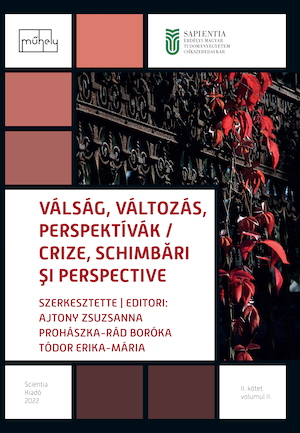A DIGITÁLISTÉR-DIMENZIÓ ÖSSZETEVŐINEK ÉS SZEREPLŐINEK FELMÉRÉSE: A DEBRECENI EGYETEM ÉS GYAKORLÓ ISKOLÁI
A SURVEY OF THE COMPONENTS AND ACTORS OF DIGITAL SPACE: THE UNIVERSITY OF DEBRECEN AND ITS PEDAGOGICAL PRACTISING SCHOOLS
Author(s): Dóra Szabó, Erzsébet Dani
Subject(s): Higher Education
Published by: Scientia Kiadó
Keywords: online education; digital competence; competence measurement; knowledge transfer; methodology;
Summary/Abstract: In the year 2020, it is no longer surprising to read a lot about digital education, the challenges it generates, and the related negative and positive opinions. The pandemic has affected the lives of all of us. It has resulted in a situation where educators, teachers, and students have all been forced to go online – teaching/educating has entered the digital space. In this forced situation, innumerable forms and variations of educational forms and online platforms have emerged, reflecting the skills and prior experiences of the educator/teacher and the student in the digital world. Online education as a paradigm shift in teaching methodology has been a challenge for everyone. The problems of digital inequality/division have surfaced, and the differences in digital and technical skills between the generations have intensified. In our research, we are looking for answers to the following questions: 1. Challenges – solutions: What challenges do educators/teachers and students face and what individual solutions have been found? 2. Institutional/individual digital inequalities: What opportunities does the education system provide, how much has it helped the work, and to what extent has the digital divide taken hold? 3. Knowledge transfer: How effective is digital education? Is the educator/teacher able to transfer the same knowledge material as in face-to-face education? To what extent is knowledge transfer realized? Or, by analogy with the web 1.0–3.0, what impacts does learning 1.0–3.0 have? 4. Legitimacy: Can online education have legitimacy in the future? In our research, we intend to examine three agents: the student, the teacher, and the educational system. We carried out our research primarily among the students and lecturers of the University of Debrecen, but we are also curious about the situation in public education.
Book: Válság, változás, perspektívák / Crize, Schimbări şi Perspective II.
- Page Range: 187-206
- Page Count: 21
- Publication Year: 2022
- Language: Hungarian
- Content File-PDF

